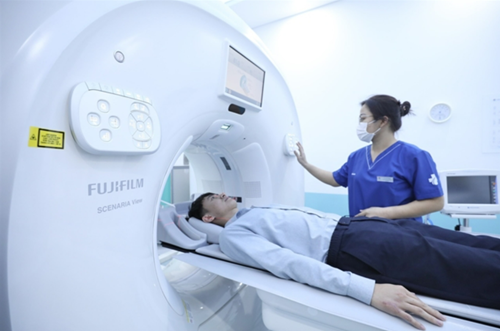The objective of the strategy, towards 2030, is to establish Vietnam as a hub for innovation and advancement in AI applications and solutions within the ASEAN region and globally.
    |
 |
|
An early cancer screening and detection system using AI in Vietnam at the Japan-owned T-Matsuoka medical center. This is the first model of its type in Southeast Asia. |
The 2008 High Tech Law and the national AI policy have established a legal framework for Vietnam to support the advancement of AI.
However, according to many experts, the AI application needs to be researched and implemented on the basis of full regulations and specific policies related to human resource development as well as responsible AI use in digital government, digital economy and digital society.
Vietnam has produced a number of AI models recently, including PhoGPT, VinBrain, LovinBot, and FPT AIMentor.
Dang Huu Son, co-founder of LovinBot artificial intelligence, vice chairman of the Vietnam Alliance for the Development of Digital Human Resources (AIID) predicted that by 2030, the AI industry in Vietnam alone would contribute up to 14 trillion VND to the digital economy.
Tran Anh Tu, deputy director of the High Technology Department, Ministry of Science and Technology, said AI is not just a practical instrument, but also a significant factor influencing innovation, competition and corporate survival.
But in order to fully realize AI's promise, a number of obstacles must be overcome, chief among them being the issue of a skilled workforce and ethical AI research, he said.
According to Associate Professor Nguyen Xuan Hoai, Director of the Institute of Artificial Intelligence, University of Technology, Hanoi National University, there is still a shortage of AI staff.
Only ten percent of the sector's annual hiring needs are filled and of the 55,000 information technology graduates, only approximately 30 per cent are employed in the field of AI, he said.
Apart from the scarcity of human resources in the AI sector, Vietnam also confronts additional difficulties such not having access to top AI specialists and consultants for assessing goods in line with market demands and not having access to business-ready platforms, tools and infrastructure.
In that context, many educational institutions have taken pioneering steps to meet human resource needs in the future of AI.
Director of Ho Chi Minh City National University Vu Hai Quan said the university is oriented to develop into a leading regional university, in which semiconductor technology, biotechnology and AI are three driving forces.
With over 6,000 undergraduates, 1,000 graduate students and 300 faculty members, the HCM City National University hopes to provide the nation with highly qualified human resources in the field of artificial intelligence.
Minister of Science and Technology Huynh Thanh Dat said following more than two years of executing the national AI policy, Vietnam has seen some positive initial results. The world and society at large acknowledge the contributions made by Vietnamese scientists and researchers in the field of AI.
Many products based on AI have been applied. A number of Vietnamese corporations and businesses are interested in making investment in AI and gradually improving the ability to access, absorb and master AI technology, he said.
According to the Ministry of Science and Technology, along with the general trend in the world, AI systems have been assessed to bring great benefits to people, society and the Vietnamese economy through support and problem solving.
Nine criteria for investigating and creating responsible AI systems are outlined by the ministry. They consist of encouraging creativity, openness, controllability, safety standards, privacy principles, upholding human rights and dignity, user assistance, and accountability.
Deputy Minister of Science and Technology Bui The Duy said ethical and responsible AI is a worldwide agenda item that is grabbing the interest of nations all over the world.
This is not simply an academic issue, nor simply a legal issue, but is related to the development of people, countries and humanity. Ethics and responsibility in AI lie in all stages, from algorithm construction, data collection, to training tools and applications. Therefore, this issue must be addressed right from the system building stage, involving many ministries and sectors, he said.
Associate Professor Nguyen Thi Que Anh, principal of the University of Law at Vietnam National University, Hanoi, said artificial intelligence is completely different from other technologies before. The ability of robots to fulfill legal obligations is also a real-time challenge for lawmakers.
Dr. Do Giang Nam, of the University of Law, said building AI needs to comply with general principles and adjustment principles for each specific field.
"Trust is the foundation for AI development. To achieve this, powerful tools are needed to ensure AI is used responsibly.
“In addition, it is necessary to focus on core pillars including legality, ethics and technological sustainability, with a people-centered approach, which is the guideline for all AI development activities,” he said.
Source: VNA